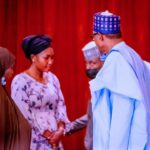
The President, Major General Muhammadu Buhari (retd.) Thursday in Abuja, reiterated the importance of an accurate census next year, saying the correct figures will help the country in planning for the citizens.
He added that the deployment of digital technology in the 2023 National Population and Housing Census will ensure effectiveness and more accuracy in the figures.
The President noted that Nigeria could rank third largest in the world by 2050, after China and India, according to a statement by his spokesman, Femi Adesina, on Thursday.
Buhari stated this while speaking at the national stakeholders’ summit on the 2023 Population and Housing Census held at the State House. ,
He said a “reliable, credible, acceptable and successful census’’ will help government in planning purpose for development, especially in bolstering the social security programme that targets more vulnerable Nigerians.
“The country’s inability to conduct a population census in the last 16 years has created an information vacuum as the data from the last census conducted in 2006 has been rendered out of date for planning purposes. It has therefore become imperative for the nation to conduct another national census to produce a new set of demographic and socio-economic data that will provide the basis for national planning and sustainable development.
“Population is a critical factor in a nation’s efforts toward achieving sustainable development. People are both the agents and beneficiaries of the development process. Knowledge of the national population in terms of size, distribution and socio-economic characteristics is required for planning purposes. This, therefore, makes the conduct of census an essential governance activity.
“With a projected population of 216,783,381, Nigeria is the sixth most populous country in the world and the most populous country on the African continent. Due to the rapidly growing nature of the population and large proportion of the youthful population, Nigeria is also projected to be the third most populous country in the World by the year 2050 after India and China,’’ he said.
Despite Nigeria’s high-ranking position on the global demographic map, the President said its population censuses had been conducted irregularly and at intervals, longer than the United Nations recommended 10 years.
“This irregular and long interval of census taking in Nigeria has denied the nation the huge benefits of comprehensive baseline data for evidence-based decision-making.
“Since our assumption of office in 2015, our administration has introduced several poverty reduction and youth empowerment programmes, which are making concrete improvements in the living standards of our people. There is a need to ensure that further implementation of these programmes will be driven by the 2023 Census data that will improve the implementation of programmes targeting vulnerable populations and ensuring as widespread coverage as possible.
“The nation requires a new data set to drive the implementation of the recently launched revised National Policy on Population for Sustainable Development and other government policies. The 2023 Census data is also needed to tackle the security challenges bedevilling the country as it will give an overview of the population, where we are and who we are,’’ he added.
Buhari said that knowing Nigeria’s population and using the data to plan for the people and future generations remain a collective duty owed the nation.
“We must all resolve that this duty is satisfactorily carried out in the firm belief that what has joined us together as a nation and our common destiny are far stronger than the negative forces that tend to drive us apart,’’ he submitted.
In his remarks, the Secretary to the Government of the Federation, Boss Mustapha, who was represented by the Special Adviser to the President, Dr Habiba Muda Lawal, said the country had a population growth rate of 2.3 per cent, and would likely be the third most populated country in the world by 2050.
She said the 2023 Census would be the first fully digital population and housing documentation and the outcome would be useful for planning and budgetary allocations.














